
-
Select format
-
- Publisher:
- Cambridge University Press
- Publication date:
- 05 June 2012
- 23 September 2010
- ISBN:
- 9780511778377
- 9780521760300
- 9780521757607
- Dimensions:
- (247 x 174 mm)
- Weight & Pages:
- 0.98kg, 422 Pages
- Dimensions:
- (247 x 174 mm)
- Weight & Pages:
- 0.82kg, 422 Pages
You may already have access via personal or institutional login
Book description
Computational semantics is the art and science of computing meaning in natural language. The meaning of a sentence is derived from the meanings of the individual words in it, and this process can be made so precise that it can be implemented on a computer. Designed for students of linguistics, computer science, logic and philosophy, this comprehensive text shows how to compute meaning using the functional programming language Haskell. It deals with both denotational meaning (where meaning comes from knowing the conditions of truth in situations), and operational meaning (where meaning is an instruction for performing cognitive action). Including a discussion of recent developments in logic, it will be invaluable to linguistics students wanting to apply logic to their studies, logic students wishing to learn how their subject can be applied to linguistics, and functional programmers interested in natural language processing as a new application area.
Reviews
‘This remarkable textbook teaches you the know-how to become an active participant in this rapidly evolving interdisciplinary field.'
Johan van Benthem - University of Amsterdam and Stanford University
‘This book is a major contribution to computational semantics. The authors provide important insights into a wide range of current issues in semantic theory, setting a very high standard for work in computational semantics.'
Shalom Lappin - King's College, London
‘The authors do an excellent job of exploring the connections between functional programming and Montague-style formal semantics for natural language. Anyone interested in logic-based computational semantics will learn something from this book.'
Stephen Pulman - University of Oxford
Contents
Metrics
Altmetric attention score
Full text views
Full text views help Loading metrics...
Loading metrics...
* Views captured on Cambridge Core between #date#. This data will be updated every 24 hours.
Usage data cannot currently be displayed.
Accessibility standard: Unknown
Why this information is here
This section outlines the accessibility features of this content - including support for screen readers, full keyboard navigation and high-contrast display options. This may not be relevant for you.
Accessibility Information
Accessibility compliance for the PDF of this book is currently unknown and may be updated in the future.


